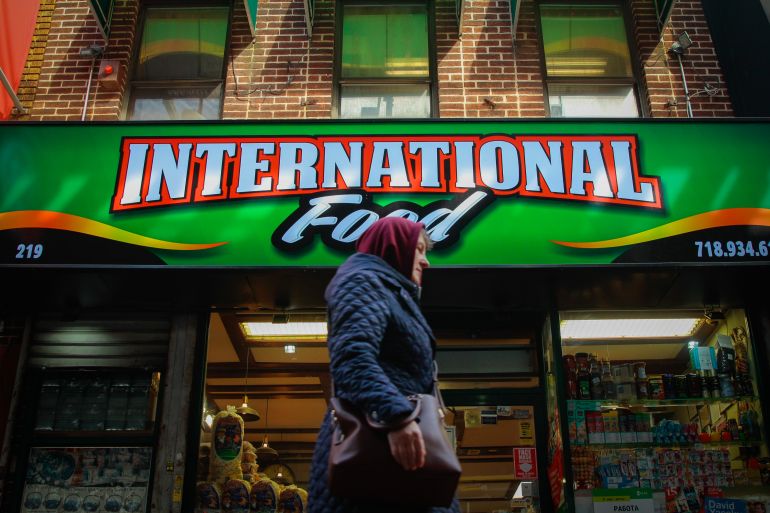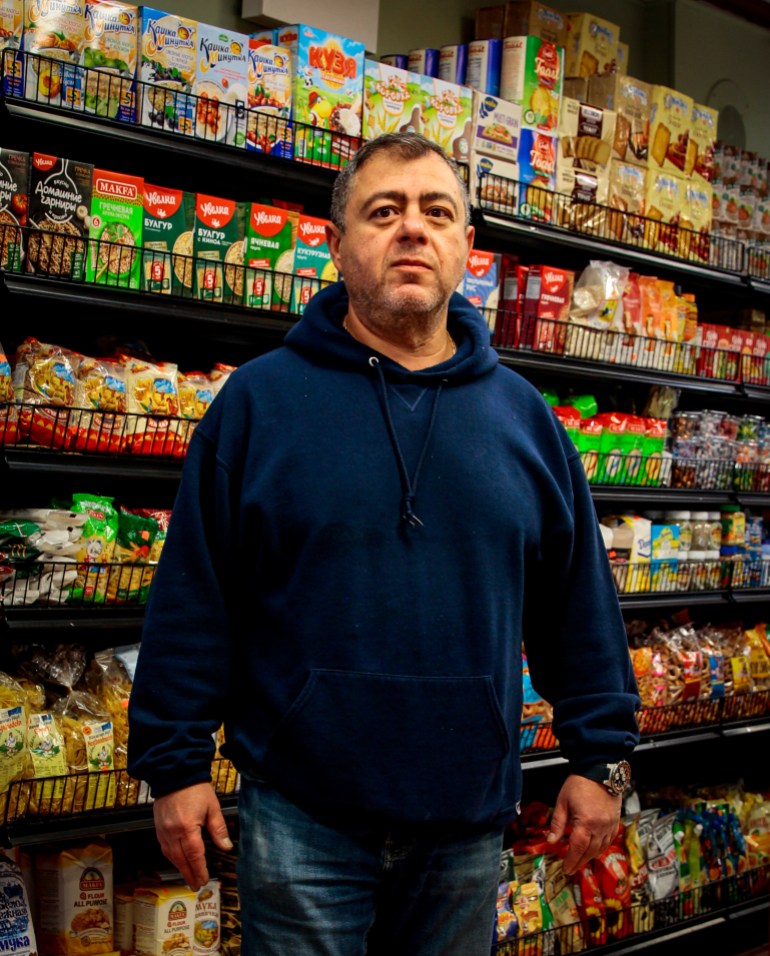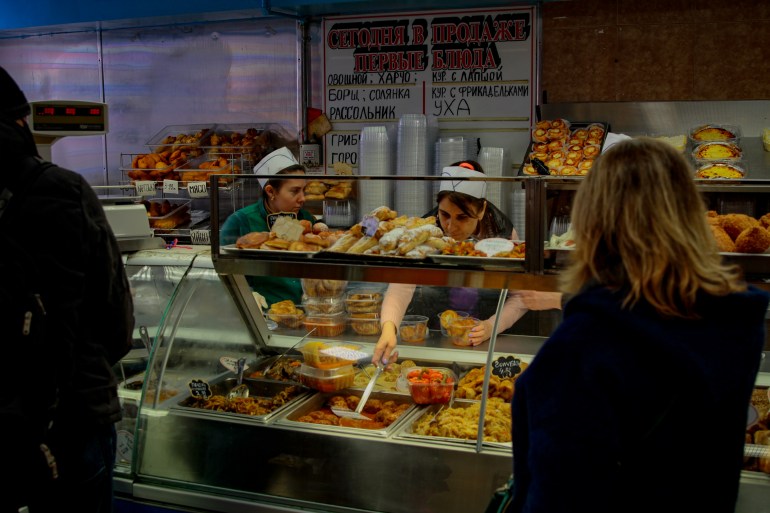What’s in a name? Russians in New York adapt amid Ukraine war
As some remove references to Russia from business names, others say it’s unfair to blame all Russians for Ukraine war.

Brighton Beach, New York, US – Soon after Russia invaded Ukraine last month, a popular deli in the New York neighbourhood of Brighton Beach, home to a large ex-Soviet diaspora, opted to remove its plastic “Taste of Russia” sign.
“We felt, living in the Russian-speaking community, that it was the right thing to do,” co-owner Bobby Rakhman, who was born in Odesa, Ukraine, told Al Jazeera, standing next to employees with blue-and-yellow ribbons pinned to their uniforms.
Keep reading
list of 3 itemsUkraine war: Russian billionaire Abramovich tries to broker peace
Russia has effectively admitted defeat In Ukraine
Since the Russia-Ukraine war broke out, many in Russian-speaking communities across the United States have been grappling with a similar conundrum: Is it better to remove references to Russia from events and business names as a show of solidarity with Ukraine, or are such actions misguided, conflating all things Russian with Moscow’s current war?
Brighton Beach, a coastal community along Brooklyn’s southern edge, is home to many immigrants from the former Soviet Union. They have prospered here, opening law firms, medical clinics and grocery stores selling Georgian, Uzbek and Russian foods. While they are united by their shared Russian language, many have distanced themselves from the politics back home.

As Russian President Vladimir Putin’s assault on Ukraine grinds on, boycotts have proliferated around the world, with orchestras pulling Tchaikovsky programmes from concerts and angry civilians vandalising Russian restaurants.
Watching such events unfold, some in New York’s Russian-speaking community have been reexamining how they define themselves.
Michael Drob and his wife started a Facebook group called the Russian Parents Network more than a decade ago after their first child was born; many of its nearly 20,000 members are from southern Brooklyn. The idea was to share information about babysitters and activities for children – not to take political stances.
But since the Russian invasion, Drob has changed the name to the Russian-speaking Parents Network, accounting for the fact that the group also includes Ukrainians, Kazakhs and others from the former Soviet Union.
The network’s new name “more closely align[s] with what it stands for”, Drob wrote in an explanatory post, punctuated with Ukrainian flag emojis. In an interview with Al Jazeera, he added, “I felt it was just more representative to call it ‘Russian-speaking’, so that there are no questions about the affiliations.”
Differing views
Meanwhile, others have made a conscious choice to keep “Russia” in their names.
Michael Levitis, who hosts a popular Russian-language FM radio show and runs a Facebook group called Russian Insider with about 17,000 members, said that with tensions running high in Brighton Beach, “right now, symbols matter more than substance”.
“We should not give in to this hysteria, where Tchaikovsky isn’t being played, where Russian performers are being made to speak up against Putin, even though they’re Russian citizens and their careers and families back home are at stake,” he told Al Jazeera, referencing the massive repression of anti-war demonstrations in Russia.

In his Facebook group, members have expressed concerns that Russians were being held accountable for their country’s actions in a way that Americans never are.
“I don’t remember American performers being asked to apologise for the US when the US invaded Iraq on false premises,” Levitis said.
Similarly, Julia Barinova, an insurance broker from neighbouring Sheepshead Bay, said she was “insulted” by the cultural boycott of all things Russian. “Cancelling things like the cultural wealth of the nation, the history – it’s basically destruction,” she told Al Jazeera.
Earlier this month, at a Ukraine solidarity protest on the Brighton Beach boardwalk, several attendees draped themselves in an amended Russian flag, with stripes of white, blue and white. “We took out the red because we are against bloodshed,” one man explained.
“Russia is not Putin,” another protester declared as the crowd cheered. “Russia was there before Putin, and Russia will be there after Putin.”
As for the “Taste of Russia” sign removal, residents of Brighton Beach had varying opinions, with some calling it a performative gesture, and others applauding the move. “I wouldn’t want to go in there if they didn’t change the name,” Khrystyna Vosylyshyn, who co-owns a nearby clothing store and has family in western Ukraine, told Al Jazeera.
Rahkman has since erected a new sign in its place, declaring simply: “International Food”.
It’s the name of his father’s old deli, which opened in this same neighbourhood four decades ago. “I’ve seen people actually stand and look at the sign, and just cry,” Rakhman said. “Like the name was reborn again.”
